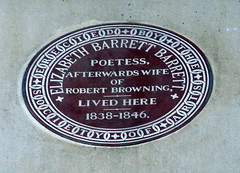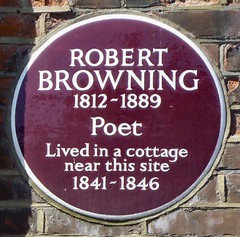Robert Browning


Robert Browning
(1812-1889)
Family tree
Commemorated on 6 plaques
Elizabeth Barrett Barrett Poetess, afterwards wife of Robert Browning, lived here 1838-1846
50 Wimpole Street, London, United Kingdom where they was
Robert Browning poet 1812-1889 lived in Warwick Crescent 1862-1887
Warwick Crescent, London, United Kingdom where they was
Robert Browning 1812-1889 Poet Lived in a cottage near this site 1841-1846
Haberdashers Aske's School, Jerningham Road, SE14, London, United Kingdom where they lived near
Robert Browning lived in this house 1887-1889 From here his body was taken for interment in Poets' Corner Westminster Abbey
29 De Vere Gardens, W8, London, United Kingdom where they lived
Robert Browning poet born Camberwell 1812 lived on this site in Hanover Cottage 1824-40
179 Southampton Way, SE5, London, United Kingdom where they lived
Sedotta dal fascino di ouesta vallata nell estate del 1849 Elizabeth Barrett consegno la dichiarazione poetica del suo eterno amore allo sposo Robert Browning. 'Ma amami per amor dell amore, che sempre piu tu passa amarmi nell eternita dell amore' (Sonetti Dal Portoghese, XIV:13-14)
English translation: Seduced by the charm of this valley in the summer of 1849, Elizabeth Barrett composed the poetic statement of her eternal love for her husband Robert Browning. 'But love me for the sake of the love that passes more and more you love me in the eternity of love' (Sonnet of the Portuguese, XIV:13-14)
?, Bagni di Lucca, Italy where they visited





